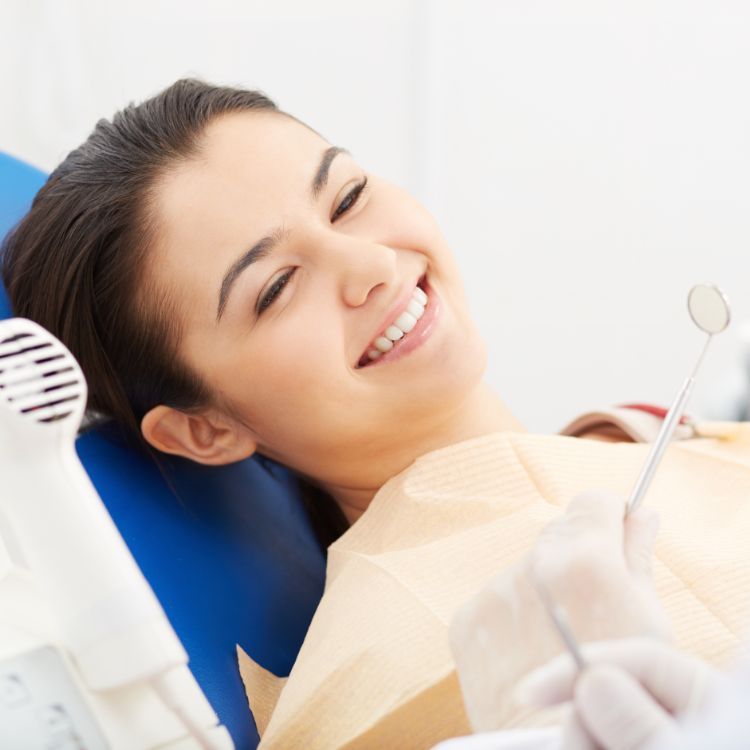Thanksgiving with Braces or Aligners: How to Enjoy the Meal While Protecting Your Smile

Table of Contents
Introduction
Understanding Braces and Aligners
Traditional Braces vs. Invisalign®
Thanksgiving Foods to Approach with Caution
Sticky Foods
Crunchy or Hard Foods
Sugary Treats
Safe Thanksgiving Foods for Braces and Aligners
Soft Turkey and Other Protein Options
Mashed Potatoes and Gravy
Casseroles and Soft Veggies
Foods to Avoid with Braces
After-Meal Care for Braces and Aligners
Cleaning Braces Post-Meal
Proper Care for Aligners After Thanksgiving Dinner
Avoiding Emergencies During the Holidays
Dr. Cathleen George & Dr. Jordan Cogan: Your Local Orthodontic Experts
Conclusion
Frequently Asked Questions
Introduction
Thanksgiving is a time to relax, reconnect, and enjoy some of the year's best food. However, if you or your loved ones are wearing
braces or
Invisalign® aligners, you'll want to consider a few adjustments to your eating habits. You can enjoy your Thanksgiving meal without compromising your orthodontic journey with the right tips and tricks. CG Orthodontics, with over 25 years of experience, has compiled some practical tips to help you enjoy every part of your Thanksgiving meal while protecting your smile.
Understanding Braces and Aligners
Orthodontic treatment comes in various forms, with traditional braces and Invisalign® being among the most popular choices. Each of these requires specific care during meals, especially Thanksgiving, when foods can be harder to manage.
Traditional Braces vs. Invisalign®
Traditional braces use brackets and wires to straighten teeth. Although durable, they can be damaged by sticky, hard, or chewy foods, making it necessary to be mindful during meals.
Invisalign®, on the other hand, is a series of clear, removable aligners that gently shift teeth over time. While they offer more flexibility with eating, they also require careful cleaning and maintenance to avoid staining and bacteria buildup.
Thanksgiving Foods to Approach with Caution
Thanksgiving spreads are often filled with various delicious, but sometimes problematic, foods. Here are some types to watch out for if you're wearing braces or aligners:
Sticky Foods
Sticky foods like caramelized yams or marshmallow-topped dishes are hard to clean off braces. If not removed properly, they can get lodged in wires, increasing the risk of damage or decay.
Crunchy or Hard Foods
Nuts, hard bread crusts, and raw veggies can easily damage brackets or wires. Even aligner users should avoid these since crunchy bits can get stuck between teeth, which could be problematic if aligners are put back on without thorough cleaning.
Sugary Treats
Pies, cookies, and other sweet treats are everywhere on Thanksgiving. While it's okay to enjoy a small amount, sugary foods create acids that harm tooth enamel, increasing the risk of cavities. This is especially important for those with braces, as removing all particles from the brackets and wires is harder.
Safe Thanksgiving Foods for Braces and Aligners
Fortunately, there are plenty of Thanksgiving dishes that are braces and aligner-friendly. Soft, well-cooked foods are generally the safest option for a worry-free meal.
Soft Turkey and Other Protein Options
When served without crispy skin and well-cooked, turkey is an excellent choice. The meat is soft and easy to chew, making it ideal for braces wearers. Other tender protein options like ham can also be enjoyed.
Mashed Potatoes and Gravy
Mashed potatoes are soft and easy to eat, posing no risk to braces or aligners. Just go easy on the butter and gravy, as excess oils and sugars can increase plaque buildup.
Casseroles and Soft Veggies
Casseroles with soft, cooked vegetables are great for braces. Green bean casserole, soft squash, and carrots cooked until tender are all safe options. Avoid dishes with nuts or crunchy toppings, though, as these could damage braces or be difficult to clean.
Foods to Avoid with Braces
Certain foods should be outright avoided to protect your braces and ensure your treatment stays on track. Here's a quick list of what to keep off your plate this Thanksgiving:
- Nuts and Seeds: Their hard texture can break brackets and wires.
- Crunchy Raw Vegetables: Opt for cooked veggies instead to avoid added pressure on braces.
- Chewy Candies and Caramel: They can easily get stuck in braces and are difficult to remove.
- Corn on the Cob: If you want corn, cut it off the cob to avoid damaging your braces.
After-Meal Care for Braces and Aligners
Thanksgiving meals are often long, drawn-out affairs where people sit around the table enjoying food, conversation, and seconds (or thirds!) of their favorite dishes. While it's tempting to sink into a food coma right after your meal, taking a few extra minutes to care for your braces or aligners is essential for keeping your orthodontic treatment on track and protecting your oral health. Proper after-meal care is crucial to avoid food buildup, plaque formation, and staining, which can complicate or extend your treatment.
Cleaning Braces Post-Meal
After a hearty Thanksgiving meal, food particles get trapped around brackets and wires, creating the perfect environment for plaque buildup. Here's a step-by-step guide to ensure your braces are thoroughly cleaned and ready for the rest of the day:
1. Use a Soft-Bristled Brush
- Start with a gentle, soft-bristled toothbrush to protect your braces from damage.
- Tilt your brush at a 45-degree angle to reach all sides of the brackets. Brush above, below, and directly on the brackets to dislodge food particles and plaque.
- Pay extra attention to the gum line, as food tends to accumulate there, potentially causing inflammation or gingivitis if left uncleaned.
- Take your time – brushing for at least two to three minutes will ensure thorough cleaning.
2. Floss Thoroughly
- Use a floss threader or orthodontic floss designed for braces, as it can more easily maneuver around wires and brackets.
- Slide the floss carefully under each wire and between each pair of teeth, moving it gently up and down to remove any hidden food debris.
- Be meticulous, especially if you've eaten sticky or fibrous foods like turkey or stuffing, as they're likely to get caught in hard-to-reach areas.
- For extra convenience, you can use an interdental brush or water flosser. Both are highly effective at dislodging food from tight spots around braces, especially if you're in a rush.
3. Rinse with Mouthwash
- A quick rinse with an antibacterial or fluoride mouthwash can help flush out any lingering particles that brushing and flossing may have missed.
- Swish the mouthwash around for about 30 seconds to a minute, focusing on areas with brackets and wires.
- Not only does mouthwash freshen your breath, but it also helps reduce bacteria that cause plaque, lowering your risk of developing cavities or gum issues.
4. Check for Leftover Food Particles
- Before finishing, look closely in the mirror to check for any remaining food around your braces.
- If you notice any bits that didn't come loose, use an interdental brush or go over those areas with your toothbrush again.
Spending a few extra minutes on your braces care will go a long way in maintaining your oral health and keeping your braces intact through the holiday season.
Proper Care for Aligners After Thanksgiving Dinner
Aligners offer the benefit of being removable, making it easy to enjoy your Thanksgiving feast without worrying about food restrictions. However, caring for your aligners post-meal is crucial for keeping them clean, clear, and effective.
1. Remove and Rinse Your Aligners
- Before you eat, always remove your aligners and store them in a case to avoid accidental loss or damage.
- After the meal, rinse them with lukewarm water to wash away saliva or buildup of bacteria.
- Avoid hot water, as it can warp the aligners, causing them to lose their shape and effectiveness.
2. Brush and Floss Your Teeth Before Reinserting
- Brushing and flossing after eating is especially important with aligners, as food particles left on your teeth can become trapped once the aligners are back in place. This can lead to bad breath, staining, and bacteria buildup, which could harm your teeth and gums.
- Use a fluoride toothpaste and a soft-bristled brush to clean every surface of your teeth thoroughly. Then, floss carefully to remove any debris from between your teeth.
- If you can't brush and floss right away, at least rinse your mouth with water before putting your aligners back in. However, make sure to brush and floss as soon as possible.
3. Clean the Aligners Thoroughly
- At least once a day, clean your aligners properly with a gentle, non-abrasive cleaner. To eliminate bacteria buildup on the aligners, you can use clear, unscented antibacterial soap or a specialized Invisalign® cleaning solution.
- Avoid using toothpaste on your aligners, as it can be too abrasive and may cause micro-scratches that make the aligners appear cloudy.
- Gently brush the aligners with a soft toothbrush and rinse with lukewarm water to keep them clear and odor-free.
4. Inspect for Any Residual Staining or Damage
- Thanksgiving foods like cranberry sauce, gravy, and other richly colored dishes can sometimes stain clear aligners. Before reinserting, check for any staining and clean them as necessary.
- If your aligners become damaged or excessively stained, contact your orthodontist to discuss whether a replacement is needed. Avoid wearing stained or damaged aligners, as they may impact your treatment.
After Thanksgiving dinner, taking a few minutes to clean your braces or aligners can make a huge difference in maintaining your oral health and orthodontic progress. By following these steps, you'll keep your smile in top shape while enjoying the holiday season!
Avoiding Emergencies During the Holidays
Thanksgiving is meant to be stress-free, so avoid orthodontic emergencies by taking a few precautions. Here are some common issues and quick fixes:
- Loose Brackets: If a bracket becomes loose, cover it with orthodontic wax to prevent discomfort until you can schedule a repair.
- Broken Wires: Gently push any protruding wire back into place and apply orthodontic wax to prevent discomfort until you can schedule a repair.
- Aligner Damage: If you accidentally damage your aligners, call your orthodontist to discuss next steps. Avoid wearing a damaged aligner to prevent further issues.
Dr. Cathleen George & Dr. Jordan Cogan: Your Local Orthodontic Experts
With over 25 years of combined experience,
Dr. Cathleen George and
Dr. Jordan Cogan at CG Orthodontics have built a reputation for exceptional, personalized orthodontic care in Pennsylvania. Specializing in traditional braces and Invisalign®, they customize each patient's treatment, ensuring every smile transformation is uniquely tailored. Known for their expertise and compassionate care, Dr. George and Dr. Cogan provide patients with clear guidance and support, creating a comfortable environment where everyone feels empowered and informed throughout their orthodontic journey.
CG Orthodontics operates from two convenient locations in Richboro and Yardley, offering state-of-the-art facilities with advanced technology for precise, efficient treatments. Boasting a 5-star rating and over 400 positive Google reviews, our CG Orthodontics team has become a trusted choice for individuals and families. Dr. George and Dr. Cogan prioritize clinical excellence and patient education, focusing on straightening teeth and enhancing overall health, confidence, and quality of life for their patients.
Conclusion
Thanksgiving can still be a joyful, delicious holiday for those with braces or Invisalign®, as long as a few simple precautions are taken. You can enjoy your Thanksgiving meal while keeping your orthodontic treatment on track by choosing braces-friendly foods, steering clear of hard or sticky items, and making time for thorough after-meal cleaning. A few small adjustments today will help ensure your smile remains healthy and bright throughout the holiday season.
Dr. Cathleen George, Dr. Jordan Cogan, and the CG Orthodontics team are committed to supporting your orthodontic journey, even through the challenges of holiday feasts and celebrations. Our expert tips will protect your progress and help you maintain excellent oral hygiene. Enjoy Thanksgiving confidently, knowing each mindful choice brings you closer to a beautifully straight, healthy smile.
Frequently Asked Questions
Can I eat turkey with braces?
Yes, turkey meat is safe if it is tender and without crispy skin. Just be cautious with seasonings or any crunchy toppings.
Do I need to clean my braces immediately after meals?
Ideally, yes. Brushing and flossing after meals can prevent plaque buildup and keep your braces in top condition.
Can I take my aligners out during Thanksgiving dinner?
Absolutely. Invisalign® aligners should be removed before eating or drinking anything other than water.
What should I do if I experience a braces emergency on Thanksgiving?
Temporary fixes like orthodontic wax can help with discomfort. Contact our office as soon as possible for further assistance.
Should I get braces or Invisalign® for better holiday eating?
Both have their pros and cons! Invisalign® offers flexibility with eating, while braces can sometimes limit food options. Dr. George and Dr. Cogan can help determine the best choice based on your lifestyle.
If you have any questions or would like to schedule a consultation, contact CG Orthodontics at
215-355-5995 or click
HERE. Transform your smile, transform your life!
















